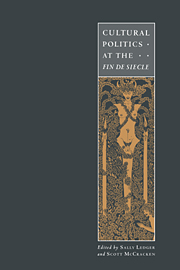Book contents
- Frontmatter
- Contents
- List of illustrations
- Notes on contributors
- Acknowledgements
- Introduction
- 1 The flight to the real
- 2 The New Woman and the crisis of Victorianism
- 3 Empire, ‘race’ and feminism at the fin de siècle: the work of George Egerton and Olive Schreiner
- 4 W. B. Yeats and Irish cultural politics in the 1890s
- 5 The double lives of man: narration and identification in late nineteenth-century representations of ec-centric masculinities
- 6 Henry James and the spectacle of loss: psychoanalytic metaphysics
- 7 ‘A very curious construction’: masculinity and the poetry of A. E. Housman and Oscar Wilde
- 8 The Pilgrims of Hope: William Morris and the dialectic of romanticism
- 9 Urban utopias: socialism, religion and the city, 1880 to 1900
- 10 Vampires and the empire: fears and fictions of the 1890s
- 11 Utopia, Limited: nationalism, empire and parody in the comic operas of Gilbert and Sullivan
- 12 Technologies of monstrosity: Bram Stoker's Dracula
- 13 Postmodernism, a Chance to reread?
- 14 Is market society the fin of history?
- Select bibliography
- Index
Introduction
Published online by Cambridge University Press: 29 September 2009
- Frontmatter
- Contents
- List of illustrations
- Notes on contributors
- Acknowledgements
- Introduction
- 1 The flight to the real
- 2 The New Woman and the crisis of Victorianism
- 3 Empire, ‘race’ and feminism at the fin de siècle: the work of George Egerton and Olive Schreiner
- 4 W. B. Yeats and Irish cultural politics in the 1890s
- 5 The double lives of man: narration and identification in late nineteenth-century representations of ec-centric masculinities
- 6 Henry James and the spectacle of loss: psychoanalytic metaphysics
- 7 ‘A very curious construction’: masculinity and the poetry of A. E. Housman and Oscar Wilde
- 8 The Pilgrims of Hope: William Morris and the dialectic of romanticism
- 9 Urban utopias: socialism, religion and the city, 1880 to 1900
- 10 Vampires and the empire: fears and fictions of the 1890s
- 11 Utopia, Limited: nationalism, empire and parody in the comic operas of Gilbert and Sullivan
- 12 Technologies of monstrosity: Bram Stoker's Dracula
- 13 Postmodernism, a Chance to reread?
- 14 Is market society the fin of history?
- Select bibliography
- Index
Summary
The idea of the fin de siècle has been given a renewed cachet by the coming end of the twentieth century. The approach of another turn-of-the-century experience has concentrated minds. After a lapse of some seventy years, Holbrook Jackson's seminal work on the 1890s has been joined by a rash of new studies. This revival of interest demands scrutiny, for within the discourse of literary and cultural criticism the end of the nineteenth century has traditionally fallen somewhere (somewhere not very interesting) between the grand narratives of Victorianism and modernism. Raymond Williams famously characterized the fin de siècle as an interregnum, half dismissing it as a ‘working-out, rather, of unfinished lines; a tentative redirection’. Such a designation of the late nineteenth century as a transitional period has led to its backwater status in literary and cultural criticism.
This volume testifies to the intense interest that the fin de siècle has for the late twentieth-century cultural critic. Current debates about the period are focused around questions of periodization and the concepts of cultural crisis and fragmentation. Both these questions are relevant to the idea of a cultural politics, by which we mean the recognition that culture is never fixed or stable and that cultural artifacts are the product of dialogue, debate and conflict.
Periodization has always been a problem for the fin de siècle because its position between cultural epochs disturbs traditional historiography.
- Type
- Chapter
- Information
- Cultural Politics at the Fin de Siècle , pp. 1 - 10Publisher: Cambridge University PressPrint publication year: 1995
- 2
- Cited by



